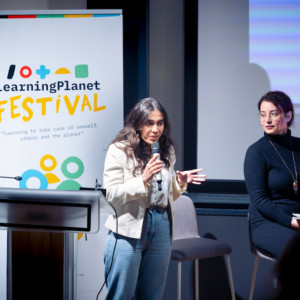World Teachers’ Day is back, as always, on 5 October! On this occasion, we aim to celebrate inspiring teachers around the world, whose work deserves to be highlighted. In this article, meet Rajashree from India, a result-oriented biology teacher with 15 + years of teaching experience, a compassionate listener with a knack for connecting with students as well as an empathetic communicator who is able to enforce classroom rules and administrative policies with ease. Rajashree is currently working in Dubai at the Ambassador School, where she is the Head of Science.
We met Rajashree through the Teachers for the Planet Programme, a global coalition co-led by the Aga Khan Foundation, Learning Planet Institute and Teach For All, which witnesses inspiring examples of outstanding educators all around us. It puts teachers and education leaders at the centre of the educational response to our climate crisis.
Are you an exceptional educator like Rajashree, working to address the climate crisis in your school? We are now collecting solutions, 100 of which will be presented to policymakers at COP28.
What are your sources of inspiration?
I draw inspiration from the dedication and innovation of my students. Also, collaborative efforts and the exchange of ideas within the team of science teachers and senior leaders are essential to progress. Ultimately, it’s the belief that science can improve lives, enhance our understanding of the universe, and shape a sustainable future that serves as my unwavering source of inspiration as a head of science.

How do you involve kids on topics that are important to you?
Engaging kids on climate change involves education through hands-on experiences, visual aids, sustainability club (ASIST) activities, and open discussions. Role modeling sustainable practices, involving them in eco-friendly projects, and organising community events instill a sense of responsibility. It also encourages them to connect with the experts and natural world to understand the impact of their choices. Ultimately, fostering awareness and a sense of purpose in kids is key to inspiring them to become informed advocates for climate change mitigation.
What’s the best advice your students have given you?
‘Remain as you are, strong and affectionate.’
What are your main challenges as a teacher?
Adapting to diverse learning styles, keeping up with rapidly evolving scientific knowledge, and fostering a deep interest in the subject among students, especially in an increasingly digital learning environment are some of the challenges teachers face these days.
How does teacher shortage affect you in your daily working life?
It doesn’t really.
Do you feel valued as a teacher? Why? Why not?
Feeling valued as a teacher can vary depending on factors like school culture, support from administrators, and student engagement. It’s important to foster a supportive environment where your contributions are recognised and you see the positive impact of your work on students’ lives to feel truly valued. I feel valued as I know I am making a difference.
How do you think the teaching profession could be better valued?
The teaching profession can be better valued through improved compensation, professional development opportunities, smaller class sizes, and greater autonomy in the classroom. Recognising and celebrating the vital role teachers play in shaping the future, both socially and economically, is essential to elevating their status and attracting top talent.
How do you think the teaching profession could be better supported? From whom do you receive the most support?
The teaching profession could be better supported through:
- Increased Funding: Adequate resources and funding are necessary for maintaining quality education, including competitive salaries, modern classroom equipment, and up-to-date textbooks.
- Mentoring Programs: Pairing new teachers with experienced mentors can help them navigate challenges and improve their teaching abilities.
- Mental Health Support: Providing access to mental health resources and counseling for both students and teachers is vital.
- Community Involvement: Encouraging community partnerships and involvement in schools can create a more supportive environment.
- Inclusive Education: Resources and training to support diverse student needs, including special education and ESL programs, are essential.
- Teacher Input: Involving teachers in decision-making processes and policy development ensures their voices are heard.
- Recognition and Appreciation: Recognizing and appreciating teachers through awards, events, and public acknowledgment boosts morale and motivation.
Ultimately, valuing and supporting teachers is essential for fostering a thriving educational system and promoting the well-being of both educators and students.
Meet Rajashree
Rajashree is a result-oriented biology teacher with 15 + years of teaching experience, a compassionate listener with a knack for connecting with students as well as an empathetic communicator who is able to enforce classroom rules and administrative policies with ease. She demonstrates self-confidence and a willingness for lifelong learning.



